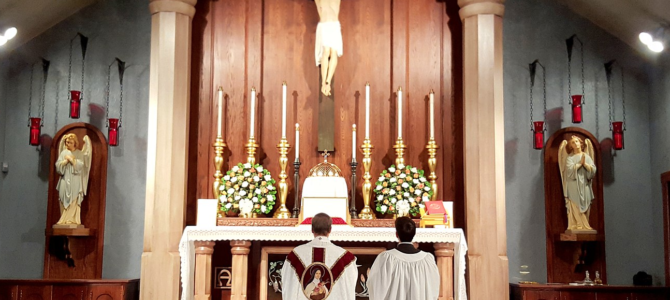
A recent essay on the Latin Mass in The Federalist startled me. A clumsy descent into pop-sociology, the article is a petty slur that gives no convincing indication of intimacy with the character of the venerable Latin Mass or with real people who celebrate it. The author echoes Pope Francis’ hostility to the Latin Mass movement. He simply dresses his put-downs in the smug tones of a well-meaning observer who knows better.
The author’s hand-me-down distortion borrows from an online sermon by Fr. Chad Ripperger, an idiosyncratic traditionalist. (A self-selected discerner of the demonic, he founded his own order of exorcists, the Doloran Fathers. Expelled from Tulsa by the local bishop in 2016, they now practice in Denver.) The admired sermon exhibits the very “elitist,” “gnostic,” and uncharitable tendencies its composer projects upon the traditionalist movement. Ripperger’s “10 Problems in The Traditionalist Movement” comes repackaged for The Federalist by Auguste Meyrat as a derivative caricature.
Meyrat Repackages the Message of Ripperger
In Meyrat’s version, the Tridentine (Latin) Mass is a magnet for off-balance, anti-social Catholics with a taste for “make believe” and “nostalgic fantasy.” They are cranks who “sneer” and “condemn.” They “harass priests who show too much compassion to slackers.” All have a “bunker mentality” that distrusts the Vatican and the secular world.
Ripperger finds “something that’s clearly demonic” in criticism of the current pontificate and, it seems, freedom of thought, tout court. Meyrat compresses his mentor’s judgment this way: “They [traditionalists] believe the mainstream church is a disgrace and everything outside the church is an apocalyptic wasteland.” Such reductive crudity is breathtaking.
Quite the sneerer himself, Meyrat continues: “Their preferred form of evangelization is having large families and sheltering them as much as possible. … This stance makes some Catholics weird.” There still exist some “normal traditional Catholics” who struggle to contain the dingbats. But, alas, close contact with these “strange and embarrassing” pewmates deprives even sane ones of a reality check. If the Latin Mass is to “save a church in crisis,” it has to flush out the fruitcakes, be more welcoming, and practice normalcy.
Meyrat’s second-hand slander redrafts Ripperger’s dyspepsia. No. 1 on the exorcist’s 10-point list is a variant of Pope Francis’ animus toward the traditionalist movement as gnostic and elitist:
And by Gnostic we mean that they think that only they have this secret knowledge that nobody else seems to have or get and somehow there’s something special about them because they get it. … They are constantly looking down and bad-mouthing everybody who goes to the New Mass [the Novus Ordo, established in 1965]. … There’s a dark side. Every Gnostic movement always suffers from grave problems of impurity and so is the traditional movement.
Ripperger goes full bore against traditionalists whom he suggests — on no evidence — have their hands in their pants more often than other people. This inspired Meyrat to tell readers that “apparently, more than a few of them [traditionalists] struggle with pornography.” That apparently palms off dubious supposition as fact.
Meyrat Misunderstands the Latin Mass
This past June, Pope Francis lamented a “culture of insults.” This, from a shepherd given to lively invective against his own flock (“modern gnostics,” “rosary counters,” “elitists,” “museum mummies,” “moralistic quibblers”). There is a grotesque touch of comedy in Meyrat mimicking Ripperger channeling Francis. In this self-devouring round-robin, both men unwittingly display the traits of what Francis dubbed “pickled, pepper-faced Christians.”
Young Catholics largely drive momentum for the Latin Mass. Many are parents who want to raise their children within a liturgical setting that encourages a disposition that sustains, rather than subverts, traditional belief. The desire cuts across ethnic and economic lines.
Faced with a shrinking Catholic school system, some choose to homeschool, others cannot. But all share the parental burden of keeping watch against a prevailing moral crudity that substitutes trendy orthodoxies — secular values — for the bedrock of virtues. To deride that vigilance as “weird,” as Meyrat does, is more obscene than the girlie magazines a 13-year-old boy might hide under a mattress.
No, traditionalists do not “lose their cool” over veils and skirts. Not every woman wears a veil (I do not.). If teenage girls do not take the Eucharist in short shorts, if men are not in cargo pants and T-shirts, it is not because fogies enforce a dress code. It is because congregants intuitively recognize ritual deportment before the altar of God as a medium of spiritual expression, a small act of prayer. No one needs a bouncer at the door. Yet Meyrat reduces that gracious recognition, uncoerced, to a cartoon. The belittlement is a bullying tactic. To what purpose?
One reason younger Catholics are drawn to the traditional Mass is that the rite stakes boundaries. It asserts vital differences between the everyday and the sacred, not between themselves and other Catholics. The rite acts as a custodian of our routes to reverence. Its formality signals an etiquette appropriate to address the Father Almighty, maker of heaven and Earth. Patrem omnipotentem, factorem coeli et terrae.
Latin, untethered to native speakers, serves as an enduring expression of the timeless and the universal. Love of the Latin Mass is hardly a matter of “protecting the gospel from people with bad taste,” to use Meyrat’s malicious expression. Rather, it is cherished as an impetus to awe and wonder, a brace against popular dissolution of deference, reticence, and that fear of the Lord at the heart of a religious impulse.
The Traditional Latin Mass Parish Hardly Exists
The author presumes to instruct “members and leaders of TLM parishes” but without
recognizing the rarity of a TLM parish. It hardly exists. Particular orders (e.g. the Doloran
Fathers ) are dedicated to the traditional Mass. But they exist outside the diocesan system and at
the sufferance of local bishops. The energy of the TLM movement is within the dioceses.
All diocesan parishes have been bound to the Novus Ordo, the “new” vernacular Mass, since 1965. Where the Tridentine Mass is offered, largely by lay request, it is simply one part of the weekly or monthly Mass schedule: once a month in one parish; every second Monday in another; elsewhere, Latin Mass might fit in between one in English at 8 a.m. and Spanish at 1 p.m. Each Mass is open to all comers.
There also exist ad hoc Latin Mass communities which have no church of their own. They beg time in an existing parish. (Mine holds Mass in a Maronite church at 3 p.m. on Sunday after parish services are finished. Prayer books are in Arabic for the official Syrian and Lebanese congregation.) Our celebrant is one of a small volunteer cadre of priests — circuit riders who take time from their assigned commitments to offer a Mass they revere.
Manhattan’s Church of the Holy Innocents is a good example of the kind of sensibility that hosts the Tridentine Mass. Of five daily Masses, only one is in the traditional Roman Rite. Sunday offers two in Latin, one in English.
In keeping with its name, a reference to the Matthean telling of slaughter of the innocents under Herod, the church maintains a Shrine of the Unborn. Dedicated to the memory of all who died “before or at birth,” women are invited to add their baby’s name to the shrine’s register. On each month, a candle is lit and Mass offered for them. A certificate in commemoration is issued to any woman who asks. She can remain anonymous if she chooses. To the women:
May you experience comfort and peace in knowing your child will be remembered! The first Monday of every month at our 12:15 pm Mass honors the unborn listed in the BOOK OF LIFE and their family.
“Blessed are those who mourn, for they shall be comforted.” No woman is excluded from the blessing. The word abortion goes unspoken. “A voice was heard in Ramah … Rachel weeping for her children.” Every Rachel is welcome. No finger is pointed. Meyrat’s fuzzy indictment of traditionalists for callous indifference — “some criticize that they can be slow to offer help” — is slander.
Worship Has Doctrinal Implications
Mirroring Ripperger, Meyrat accuses traditionalists of “taking pride in their liturgical and aesthetic superiority.” He misreads an appreciation — not necessarily articulated, and unrelated to race or class — among growing numbers of Catholics that the culture of the New Mass disappoints the theology it professes.
Acts of worship have doctrinal implications. Prudence and desire are intuitive prompts that urge retreat from protocols which, however valid, obscure the content of the faith we strive to hold. The sign system of a faith tradition matters. That is why Catholics continue to seek out the Latin Mass. To reduce the sensitivity of that quest to “pride in their liturgical and aesthetic superiority” is as vulgar as it is off-base.
The old Roman Rite has called successive generations of disparate peoples with the sharp, plangent treble of the sanctuary bell. Discarded in the Novus Ordo, it is a sound for a world charged, in the poet’s phrase, with the grandeur of God. Sanctus, sanctus, sanctus, Dominus Deus Sabaoth. From this brief, ecstatic moment, listeners gain heart — each of us, whatever our circumstances — for the silent road beyond all hosannas. What we call identity politics dissolves in the ring of it.
Liturgy both mirrors and fosters a culture. There is grace in cherishing a worship tradition that resists kingdoms cut to man’s own specifications. One that reminds us in the midst of life, and of our love of it, there remains a frontier between the church and the world.
Pace Meyrat, Catholics do not seek out the Latin Mass to “save a church in crisis.” They go in obedience to the injunction: “Seek first the kingdom of God.”









